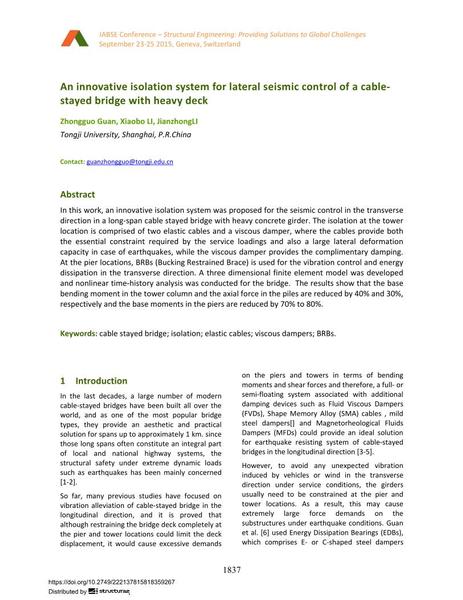An innovative isolation system for lateral seismic control of a cable- stayed bridge with heavy deck

|
|
|||||||||||
Détails bibliographiques
| Auteur(s): |
Zhongguo Guan
(Tongji University, Shanghai, P.R.China)
Xiaobo Li (Tongji University, Shanghai, P.R.China) Jianzhong Li (Tongji University, Shanghai, P.R.China) |
||||
|---|---|---|---|---|---|
| Médium: | papier de conférence | ||||
| Langue(s): | anglais | ||||
| Conférence: | IABSE Conference: Structural Engineering: Providing Solutions to Global Challenges, Geneva, Switzerland, September 2015 | ||||
| Publié dans: | IABSE Conference Geneva 2015 | ||||
|
|||||
| Page(s): | 1837-1844 | ||||
| Nombre total de pages (du PDF): | 8 | ||||
| Année: | 2015 | ||||
| DOI: | 10.2749/222137815818359267 | ||||
| Abstrait: |
In this work, an innovative isolation system was proposed for the seismic control in the transverse direction in a long-span cable stayed bridge with heavy concrete girder. The isolation at the tower location is comprised of two elastic cables and a viscous damper, where the cables provide both the essential constraint required by the service loadings and also a large lateral deformation capacity in case of earthquakes, while the viscous damper provides the complimentary damping. At the pier locations, BRBs (Bucking Restrained Brace) is used for the vibration control and energy dissipation in the transverse direction. A three dimensional finite element model was developed and nonlinear time-history analysis was conducted for the bridge. The results show that the base bending moment in the tower column and the axial force in the piles are reduced by 40% and 30%, respectively and the base moments in the piers are reduced by 70% to 80%. |
||||

